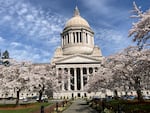
The Washington state Capitol in Olympia.
Austin Jenkins / Northwest News Network
Often a contentious topic, particularly in Southwest Washington, potential tolls for the Interstate 5 bridge found unanimous support in Olympia on Thursday.
The Washington Senate Transportation Committee held court on a bill that would give transportation officials the greenlight to someday set up tolls on the bridge. Revenues would help pay for a multibillion-dollar replacement bridge that is years from breaking ground.
The hearing lasted about 15 minutes and every speaker shared their support for having drivers pay a fee to cross.
“We can argue about the design, how many lanes... and whether we put light rail on it or not,” said Sen. Curtis King, R-Yakama. “But we all know that it needs to be tolled.”
The bill will likely pass out of the transportation committee in the coming days before facing a vote on the state Senate floor. An identical bill is charting its way through the House.
Public supporters at the meeting included Vancouver City Councilor Erik Paulsen and lobbyists representing the Port of Vancouver, a coalition of Clark County businesses and the grocery chain Fred Meyer.
The businesses, through their lobbyists, largely said the commercial promise of a new, potentially less-congested bridge outweighed any costs of tolls. A new bridge would also be seismically stronger and safer, they noted.
An undercurrent to the speakers’ statements: Tolls are routine across the United States, even as they’re a rarity in the Northwest.
“We’re not special,” Paulsen said. “There’s not a major transportation project under construction or being planned in this country right now that does not include tolls.”
The price drivers could pay to cross the bridge has not been finalized. The latest estimates from planners say it could land between $1.50 and $3.55. They are also intending to use “variable rate tolling,” where the price would rise and fall based on the amount of traffic.
Planners have said they aim to offer reduced tolls for low-income drivers.
If lawmakers do ultimately say yes to the plan, it doesn’t mean drivers would start paying immediately. The bill says Gov. Jay Inslee’s office would have to agree the replacement project has “sufficient” funding, and then transportation officials from both Washington and Oregon would have to hammer out an agreement.
The bill does not authorize tolling on Interstate 205, a measure that has been considered in Oregon. Neither does it OK tolling on I-5 anywhere beyond the bridge in Washington state.
Tolls factor heavily into the massive plans to replace the aging span that connects the two states over the Columbia River. The entire project is expected to cost upwards of $5.5 billion. Of that, tolls could pay for between $1.1 and $1.6 billion.
Washington state has already agreed to pay $1 billion from a recent transportation package. Oregon lawmakers are currently devising their own plans to add another $1 billion.
Planners are also hoping to net billions more in federal dollars. If they head into the summer with tolling power and the down payments from both states, they hope to make an effective funding pitch to agencies like the Federal Transit Authority and the Federal Highway Administration.
“We’re looking forward to proceeding into the grant application process strongly with the support of both states’ legislatures and the pledge of dollars and tolling authority to move this forward,” said Greg Johnson, administrator of the Interstate Bridge Replacement Program.
Tolling’s support in Thursday’s hearing contrasts with recent history. Sen. Annette Cleveland, D-Vancouver, recalled tolling as a flashpoint when the two states tried to replace the I-5 bridge last decade.
“I think our political leadership has changed from the local level on up,” Cleveland said. “We have policy-makers and elected officials in key positions who better understand how important replacing that bridge is.”
Still, it’s hard to draw conclusions from a small meeting, Paulsen noted. Like Cleveland, he acknowledged there could be a shift in the political climate in Southwest Washington.
“I think that folks who know what it takes to do major infrastructure project in this day and age know it won’t move forward without tolling,” he said.
But a new cohort of politicians may not be the only difference. Paulsen added that this project has the benefit of learning from the mistakes that doomed the previous Columbia River Crossing plan. He said planners have done a better job educating the public about its plans, including setting up a toll.
“I know there are voices out there who are in opposition to tolls, but the passage of 10 years has given us an opportunity to learn a lot more about what it takes to build a bridge,” he said.